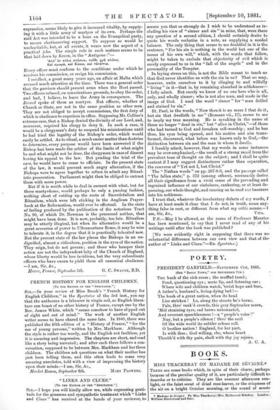"LINKS AND CLUES."
[To TER EDITOR OP THE " BEECTATOR."]
SIR,—I hope you will kindly allow me, while expressing grati- tude for the generous and sympathetic treatment which " Links and Clues " has received at the hands of your reviewer, to
assure you that so strongly do I wish to be understood as in- cluding his view of "sinner and sin" in mine, that, were there any question of a second edition, I should certainly desire to quote his words verbatim in a note, as supplying a needed balance. The only thing that seems to me doubtful in it is the sentence, " For his sin is nothing in the world but one of the issues of his own will," which, with the words that follow, might be taken to exclude that objectivity of evil which in surely expressed to us in the "fall of the angels" and in the personality of the Tempter.
In laying stress on this, is not the Bible meant to teach us that God never identifies us with the sin in us ? That we may, however, unite ourselves to it by clinging to and wilfully " living " in it—that is, by remaining absorbed in selfishness— I fully admit. But surely we know of no one here who is all„ only, and wholly sinner ; who is not also man, and made in the image of God. I used the word " sinner " for " man defiled and stained by sin."
St. Paul, in the words, "Now then it is no more I that do it, but sin that dwelleth in me" (Romans vii., 17), seems to me to imply my true meaning. He is speaking in the name of those no longer " dead in sin," but " alive in Christ,"-of those who had turned to God and forsaken self-worship ; and he has thus, his eyes being opened, and his motive and aim trans- formed, discovered, what before was known only to God,—the distinction between sin and the man in whom it dwells.
I frankly admit, however, that my words in some instances. may be over-emphasised,—the result of a strong recoil from the prevalent tone of thought on the subject ; and I shall be quite content if I may suggest distinctness rather than separation, the converse of "Yet not I, but Christ."
The "Nathan words" on pp. 267-8-9, and the passage called " The fallen state," p. 372 (among others), necessarily derive. all their significance from a vivid sense of the pervading and ingrained influence of our sinfulness, cankering, or at least de- pressing, our whole thought, and causing us to read our baseness into his nobleness.
I trust that, whatever the involuntary defects of my words, I have at least made it clear that I do not, in truth, mean any- thing false in root, or different from what my critic means.—I am, Sir, &c., VITA. P.S.—May I be allowed, as the name of Professor Maurice has been mentioned, to ray that I never read of any of his. writings until after the book was published P [We were evidently right in supposing that there was ne substantial difference between our own view and that of the author of " Links and Clues."—En. Spectator.]






























 Previous page
Previous page